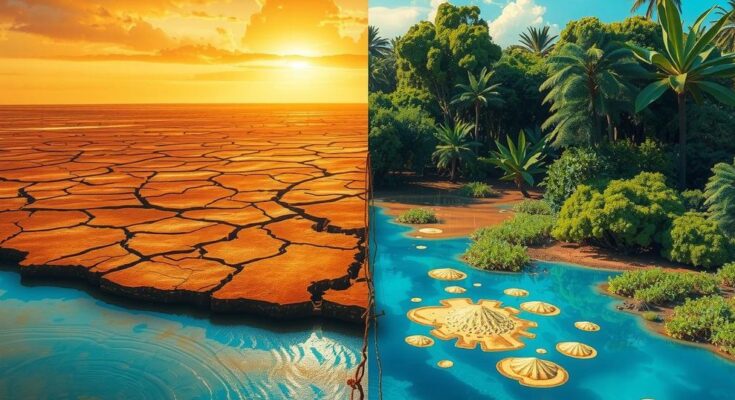Indigenous migrants in La Guajira, Colombia, particularly the Wayuu, are significantly affected by worsening climate conditions, including severe droughts and flooding. Many reside in informal settlements lacking basic amenities, escaping economic difficulties from Venezuela. Increased health risks, property losses, and the need for resources are pressing challenges, while local initiatives strive for resilience and adaptation amid ongoing struggles.
In La Guajira, Colombia, the Wayuu people are enduring severe climate challenges due to worsening droughts and floods, resulting in food insecurity and displacement. Nelly Mengual, a 47-year-old resident of an informal settlement, recounts how a recent storm damaged her makeshift home, highlighting the precarious living conditions for many Wayuu, Indigenous to the region that spans Colombia and Venezuela. Many migrants, having fled Venezuela’s economic crisis, live without basic amenities such as running water and electricity.
The Wayuu, the largest Indigenous group in Colombia, are particularly impacted by the dual threats of prolonged drought and intense rainfall. These climate conditions cause home damage, deplete water sources, destroy crops, and heighten health risks, prompting many families to migrate to urban areas in search of resources, consequently straining those locations further. Ingrid Gonzalez, a community leader, notes that traditional mud houses are especially vulnerable to flooding, leading to significant property loss.
Samuel Lanao, head of Corpoguajira, mentions that extreme flooding in 2024 led to extensive losses within Indigenous communities and an increase in vector-borne diseases. In response, Corpoguajira has initiated a Climate Change Plan focused on emission reduction and enhancing resilience. This sentiment is echoed by Camilo Martinez from the Danish Refugee Council, who has observed firsthand the drastic shifts in weather patterns over the past 14 years, which have disrupted traditional lifestyles.
The intense heat experienced last year notably affected health in informal settlements according to Gonzalez, while livestock also suffered due to the climate. Many Wayuu continue to uphold semi-nomadic lifestyles, residing in rancherias, but face significant challenges, including a lack of access to clean water. Mr. Martinez stresses that many community members resort to purchasing untreated water due to their unreliable rainwater sources.
Anibal Mercado, a Wayuu leader, asserts that migrant populations are the worst affected by climate change, often engaging in recycling and garbage collection—a situation previously unseen and reflective of governmental neglect. Amid these adversities, residents are determined to rebuild their lives. Laura Pushaina, a young mother of five, continues weaving traditional hammocks despite her home being destroyed by floods, symbolizing resilience in the face of repeated hardships. Many Wayuu hope to eventually return to their rancherias in Venezuela but cite unstable conditions as a barrier to this goal.
The Wayuu community in La Guajira, Colombia, faces dire challenges due to climate change, with increasing droughts and floods exacerbating living conditions. Migrants from Venezuela experience heightened difficulties, lacking essential resources and facing health risks due to environmental changes. Efforts from local authorities and NGOs aim to address these issues, yet the community’s resilience remains a critical factor as they persist in rebuilding their lives amid ongoing adversities.
Original Source: www.independent.co.uk




